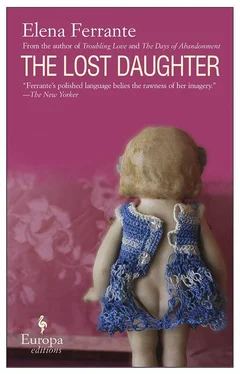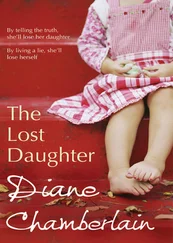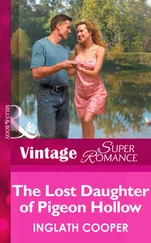He spoke very sweetly of his grandchildren, they were all his oldest son’s, the others no, no children. He created a pleasant atmosphere, and I began to feel at ease, with a sensation of positive attachment to things, the taste of the fish—it was mullet—the glass of wine, the light that radiated from the sea and beat on the glass. He talked about his grandchildren, and I began to talk about my children when they were young. Once, twenty years ago, in the snow, what fun we had had, Bianca and I—she was three, in a pink snowsuit, the hood trimmed with white fur, her cheeks bright red. Dragging our sled, we climbed to the top of a knoll, and then Bianca sat in front, between my legs. I held her tight, and down we went, at top speed, both shouting with joy, and when we got to the bottom the pink of the child’s snowsuit had disappeared, and so had the red of her cheeks, hidden under a gleaming layer of ice; only her joyful eyes were visible, and her open mouth saying: again, Mama.
I went on talking and as other happy moments came to mind I felt a longing, not sad but pleasant, for their small bodies, their wish to touch, lick, kiss, hug. Marta would be at the window every day watching for me to come home from work, and as soon as she caught sight of me she couldn’t contain herself: opening the door onto the stairs and running down, a soft little body, eager for me, running, so that I was afraid she would fall and gestured to her: slow down, don’t run. She was young but agile and confident. I would leave my bag, kneel down, and spread my arms to welcome her. She hurled herself against my body like a bullet, almost knocking me over; I embraced her, she embraced me.
Time goes by, I said, it carries off their little bodies, they remain only in the memory of your arms. They grow, they’re as tall as you, they pass you by. Already at sixteen Marta was taller than me. Bianca remained small, her head comes up to my ear. Sometimes they sit in my lap, the way they did when they were little, both talking at once, they caress me, kiss me. I suspect that Marta grew up anxious for me, trying to protect me, as if she were big and I little, and it was this effort that made her so aggrieved, with such a strong feeling of inadequacy. But these are things I’m not sure about. Bianca, for example, is like her father, not demonstrative, but she, too, at times gave me the idea that with her sharp, hard words, orders rather than requests, she wanted to re-educate me for my own good. You know how children are, sometimes they love you by cuddling you, other times by trying to remake you from the start, reinvent you, as if they thought you were badly brought up and they had to teach you how to get on in the world, what music to listen to, what books to read, what films to see, the words you should use and those you shouldn’t because they’re old now, no one says that anymore.
“They think they know more than we do,” Giovanni confirmed.
“Sometimes it’s true,” I said, “because to what we’ve taught them they add what they learn outside of us, in their time, which is always different—it’s not ours.”
“Nastier.”
“You think so?”
“We’ve spoiled them, they expect a lot.”
“I don’t know.”
“When I was a child, what did I have? A wooden gun. A clothespin was fastened to the butt, a rubber band to the barrel. You put a stone in the rubber band the way you do with a slingshot and fastened the stone and the rubber band to the clothespin. So the gun was loaded. When you wanted to shoot, you opened the clothespin and the stone flew off.”
I looked at him with sympathy, I was changing my mind. Now he seemed to me a quiet man, I no longer thought he had come to see me so that his companions would think we had had an affair. He was only looking for a little gratification to soften the impact of disappointments. He wanted to talk with a woman who came from Florence, had a nice car, beautiful clothes like the ones on TV, was on vacation alone.
“Today they have everything, people go into debt to buy stupid things. My wife didn’t waste a cent, the women of today throw money out the window.”
Even that way of complaining about the present and the recent past, and idealizing the distant past, didn’t annoy me as it usually does. It seemed, rather, a way, like many, to convince oneself that there is always a slender branch of one’s life to hang on to, and, by being suspended there, get used to the inevitability of falling. What would be the sense of arguing with him, telling him: I was part of a wave of new women, I tried to be different from your wife, perhaps also from your daughter, I don’t like your past. Why start arguing—better this tranquil lullaby of clichés. At one point he said sadly:
“To keep the children quiet when they were little, my wife would wrap a bit of sugar in a rag for them to suck on.”
“A pupatella .”
“You know it?”
“My grandmother once made one for my younger daughter, who was always crying—no one ever knew what was wrong with her.”
“You see? Now they bring them to the doctor, they treat the parents and the children, they think fathers, mothers, and newborns are sick.”
While he continued to praise bygone times, I remembered my grandmother. She must then have been more or less the age of this man, I think, but she was small, bent, born in 1916. I had come on a visit to Naples with the two children, tired as usual, angry with my husband who was supposed to come with me and at the last minute had stayed in Florence instead. Marta was crying, she couldn’t find her pacifier, my mother reproached me because—she said—I had accustomed my daughter to having that thing in her mouth all the time. I began to quarrel with her, I was fed up, she was always criticizing me. Then my grandmother took a sponge, covered it with sugar, wrapped it in a bit of gauze—from a candy box, I think—and tied a ribbon around it. A tiny being emerged, a ghost in a white robe that hid its body, its feet. I calmed down as if under a spell. Marta, too, in the arms of her great-grandmother, held the white head of that imp in her mouth and stopped crying. Even my mother relaxed, was amused, said that her mother had always quieted me like that: when I was very young and she went out, I would start to cry and scream as soon as she was out of sight.
I smiled, dazed by the wine, and leaned my head against Giovanni’s shoulder.
“Do you feel ill?” he asked, embarrassed.
“No, I’m fine.”
“Lie down for a while.”
I lay on the sofa, and he remained sitting beside me.
“Now it will pass.”
“Nothing has to pass, Giovanni, I feel fine,” I said gently.
I looked through the window, in the sky there was one cloud, white and slender, and Nani’s blue eyes were just visible; she was still sitting on the table, with her rounded forehead, her half-bald head. Bianca I nursed, but Marta wouldn’t attach herself: she cried, and I despaired. I wanted to be a good mother, an exemplary mother, but my body refused. I thought of the women of the past, overwhelmed by too many children, of the customs that helped them cure or control the most frantic ones: leaving them alone for a night in the woods, for example, or immersing them in a fountain of freezing water.
“Would you like me to make coffee?”
“No, thank you, stay there, don’t move.”
I closed my eyes. Nina returned to mind, with her back against the trunk of the tree, I thought of her long neck, her breast. I thought of the nipples that Elena had sucked. I thought of how she hugged the doll against her to show the child how one nurses a baby. I thought of the child who copied the position, the gesture. Yes, they had been lovely, the early days of the vacation. I felt the need to magnify their pleasure in order to get away from my present anguish. In the end what we need above all is kindness, even if it is pretended. I opened my eyes again.
Читать дальше












